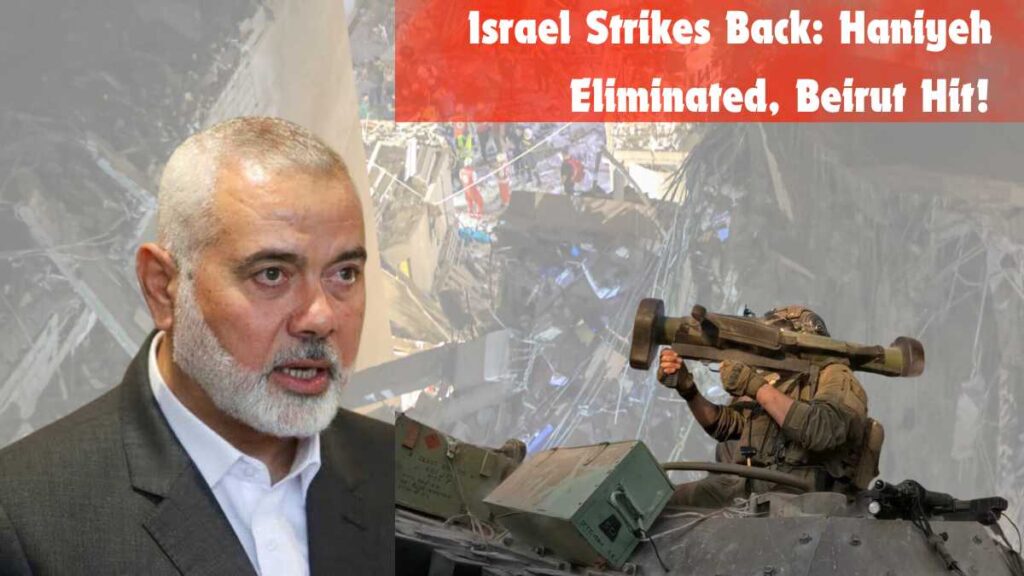Israel Bold Moves: Ismail Haniyeh Targeted and Beirut Attacked
Israel’s bold moves include striking Hamas chief Ismail Haniyeh in Iran and targeting Hezbollah in Beirut, raising global tensions.

Israel's bold moves: Eliminating Hamas chief Ismail Haniyeh and striking Hezbollah in Beirut.
Israel Bold Moves: A Target on Ismail Haniyeh
In the last 24 hours, Israel has executed unprecedented strikes, eliminating two of its most significant enemies in a move that has garnered global attention. At the center of these bold actions is the targeting of Ismail Haniyeh, the Hamas chief, in a daring operation that underscores Israel’s relentless pursuit of its adversaries.
Ismail Haniyeh: The Main Target
Ismail Haniyeh, a prominent figure within Hamas, was the primary target of Israel’s recent operations. Known for his pivotal role in orchestrating attacks against Israel, Haniyeh has long been on Israel’s radar. The strike on Haniyeh took place while he was attending a significant event in Iran, demonstrating the extensive reach of Israeli intelligence and military capabilities.
Haniyeh’s presence in Tehran was part of a grand ceremony welcoming Iran’s new president. The event saw leaders from around the world, including representatives from Russia and Saudi Arabia. However, it was Israel’s precise airstrike that stole the spotlight, eliminating Haniyeh in what can only be described as a high-stakes operation.
Impact on the U.S. and Global Reactions
The implications of this strike extend far beyond the Middle East. For the United States, a close ally of Israel, the elimination of Ismail Haniyeh is seen as a significant victory. Haniyeh, known for his anti-American rhetoric and activities, has been a thorn in the side of U.S. interests in the region. The successful targeting of Haniyeh aligns with American strategic interests and reinforces the U.S.-Israel partnership.
Globally, the reaction has been mixed. Many nations have condemned the escalation of violence, with concerns over the potential for further instability in the region. The attack on Beirut, Lebanon’s capital, has particularly drawn international criticism. Israel’s strikes in Beirut, targeting key Hezbollah figures, have raised alarms about the potential for a broader conflict.
Beirut Under Fire: A Critical Moment
The recent strikes in Beirut have brought the city into the global spotlight. Hezbollah, active primarily in Lebanon, has been a persistent threat to Israel. The elimination of Fad Shakur, a key military advisor for Hezbollah, marks a significant blow to the group’s operational capabilities. Shakur was responsible for numerous attacks on Israel’s borders, including a tragic incident that claimed the lives of 12 children playing football.
The attack on Beirut underscores the fragile state of the region. As Israel targets its adversaries with precision, the risk of retaliation from Hezbollah and Iran looms large. The international community is watching closely, with many nations urging restraint to prevent further escalation.
Israel’s Justification and the Path Forward
From Israel’s perspective, these operations are acts of justice. The brutal massacre of Israeli citizens by Hamas on October 7, 2023, remains fresh in the national memory. The elimination of figures like Ismail Haniyeh and Fad Shakur is seen as a necessary step to prevent future attacks and to demonstrate Israel’s commitment to its security.
However, the path forward is fraught with challenges. Iran, already dealing with internal turmoil following the death of its president in a helicopter accident, now faces the humiliation of an attack on its soil. The likelihood of Iran launching retaliatory strikes against Israel is high, which could further destabilize the region.
What’s Next? The Global Perspective
As these events unfold, several questions arise. How will Iran respond to the bold provocation of Israel’s targeting of Ismail Haniyeh? What measures will Israel take to protect its citizens from potential retaliation? And how will these developments impact the already fragile stability in the Middle East?
what do you think will happen next? Do you believe Iran will retaliate, or will diplomatic efforts prevent further conflict? Share your thoughts in the comments below.




